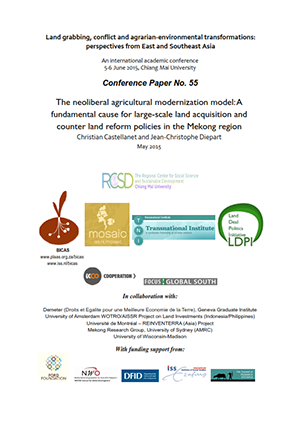Location
The purpose of the Mekong Land Research Forum online site is to provide structured access to published and unpublished research on land issues in the Mekong Region. It is based on the premise that debates and decisions around land governance can be enhanced by drawing on the considerable volume of research, documented experience and action-based reflection that is available. The online site seeks to organise the combined work of many researchers, practitioners and policy advocates around key themes relevant to the land security, and hence well-being, of smallholders in Cambodia, Laos, Myanmar, Thailand and Vietnam.
The research material on this site is mounted at three levels:
First, a selection of journal articles, reports and other materials is provided and organised thematically to assist researchers, practitioners and policy advocates to draw on one another’s work and hence build up a collective body of knowledge. This is the most “passive” presentation of the research material; our contribution is to find and select the most relevant material and to organise it into key themes. In some cases the entire article is available. In others, for copyright reasons, only an abstract or summary is available and users will need to access documents through the relevant journal or organisation.
Second, a sub-set of the articles has been annotated, with overall commentary on the significance of the article and the research on which it is based, plus commentary relevant to each of the key themes addressed by the article.
Third, the findings and key messages of the annotated articles are synthesised into summaries of each of fourteen key themes. For each key theme, there is a one-page overall summary. Extended summaries are being developed progressively for each theme as part of the Forum's ongoing activity.
Overall, we intend that this online site will contribute toward evidence-based progressive policy reform in the key area of land governance. We further hope that it will thereby contribute toward to the well-being of the rural poor, ethnic minorities and women in particular, who face disadvantage in making a living as a result of insecure land tenure.
Members:
Resources
Displaying 211 - 215 of 564The Neoliberal Agricultural Modernization Model: A Fundamental Cause for Large-Scale Land Acquisition and Counter Land Reform Policies in the Mekong Region
This conference paper examines how the ideology and programmatic set of policies coined in the term ‘neoliberal modernization’ applies to agriculture and practices in the Mekong region.
Transformative mediation, a tool for maximising the positives out of forest conflict: A case study from Kanchanaburi, Thailand
Transforming conflict is a key component of sustainable forest management. Transformative conflict mediation is an approach to transforming conflict that aims not only to resolve the conflict but also to foster long-term relationships and cooperation. This study explores how application of mediation contributed to conflict transformation.
Climate Variability, Land Ownership and Migration: Evidence From Thailand About Gender Impacts
Scholars point to climate change, often in the form of more frequent and severe drought, as a potential driver of migration in the developing world, particularly for places where populations rely on agriculture for their livelihoods. To date, however, there have been few large-scale, longitudinal studies that explore the relationship between climate change and migration. This study significantly extends current scholarship by evaluating distinctive effects of climatic variation and models these effects on men’s and women’s responsiveness to drought and rainfall.
Land grabbing and forest conflict in Cambodia: Implications for community and sustainable forest management
As a global phenomenon, land grabbing has significant economic, environmental, and social impacts, often resulting in serious conflict between the local community and outsiders. The aim of the study is to get a deeper understanding of the extent to which land grabbing and resulting land-use conflicts affect the move towards sustainable forest management (SFM) in Cambodia. Two case studies were conducted involving community forests (CFs), with data collected through literature review, key informant interviews, focus group discussions, and field observations.
Social Networks of Corruption in the Vietnamese and Lao Cross-Border Timber Trade
Although corruption is a core issue in discourses on Southeast Asian states and the region’s illegal timber trade, its specific meanings, characteristics, and role are poorly understood. Our ethnographic study of corruption and timber trade in the lower Mekong uncovers the relationships, dealings, and networks that enable illegal timber flows. We follow the disputed case of a shipment of high-value timber that originated in Laos and was seized by Vietnamese seaport customs officials in 2011.



